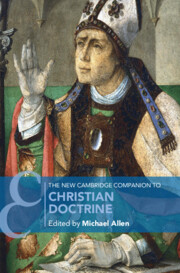Book contents
- The New Cambridge Companion to Christian Doctrine
- Cambridge Companions to Religion
- The New Cambridge Companion to Christian Doctrine
- Copyright page
- Contents
- Contributors
- Preface
- Part I Doctrines
- Part II Movements
- 11 Feminist Theology
- 12 Theological Interpretation of Scripture
- 13 Radical Orthodoxy
- 14 Public Theology
- 15 Disability Theology
- 16 Black Theology
- 17 Pentecostal Theology
- 18 Analytic Theology
- 19 Apocalyptic Theology
- 20 Reformed Catholicity
- 21 Ressourcement Thomism
- Index
- Cambridge Companions to Religion (continued from page iii)
- References
14 - Public Theology
from Part II - Movements
Published online by Cambridge University Press: 03 November 2022
- The New Cambridge Companion to Christian Doctrine
- Cambridge Companions to Religion
- The New Cambridge Companion to Christian Doctrine
- Copyright page
- Contents
- Contributors
- Preface
- Part I Doctrines
- Part II Movements
- 11 Feminist Theology
- 12 Theological Interpretation of Scripture
- 13 Radical Orthodoxy
- 14 Public Theology
- 15 Disability Theology
- 16 Black Theology
- 17 Pentecostal Theology
- 18 Analytic Theology
- 19 Apocalyptic Theology
- 20 Reformed Catholicity
- 21 Ressourcement Thomism
- Index
- Cambridge Companions to Religion (continued from page iii)
- References
Summary
In an essay exploring how Christian ethics became distinct from Christian doctrine, Stanley Hauerwas writes: “Once there was no Christian ethics simply because Christians could not distinguish between their beliefs and their behaviour. They assumed that their lives exemplified (or at least should exemplify) their doctrines in a manner that made a division between life and doctrine impossible.”1 We could write similarly of public theology: “Once there was no public theology simply because Christians could not distinguish between their beliefs and the public implications of those beliefs. It took particular social, historical, and intellectual circumstances for a division between ‘theology’ and ‘public theology’ to seem possible.” In other words, historically contingent reasons led to the emergence of “public theology” as a theological discourse beginning in the 1970s.
- Type
- Chapter
- Information
- The New Cambridge Companion to Christian Doctrine , pp. 231 - 248Publisher: Cambridge University PressPrint publication year: 2022
References
Further Reading
- 1
- Cited by

